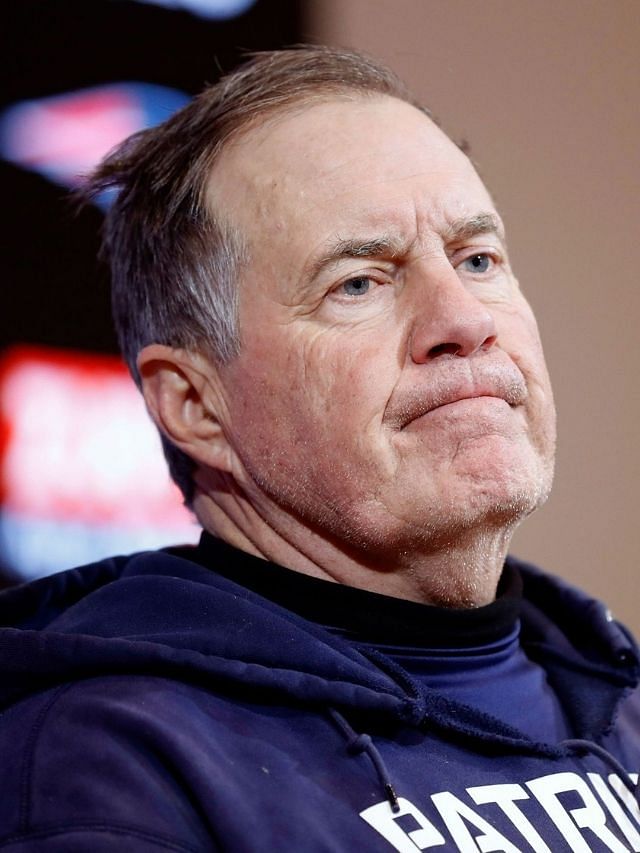Is Bill Belichick's personal life becoming the latest talking point in sports circles? The legendary NFL coach, known for his tactical brilliance and stoic demeanor, has recently found himself at the center of a viral sensation. A doorbell camera captured footage of a shirtless Belichick leaving a home, sparking widespread curiosity and debate. This incident has not only fueled speculation about his private life but also added an unexpected dimension to his public persona. As one of the most respected figures in American sports, this moment raises questions about privacy, fame, and the evolving narrative around professional athletes' personal lives.
The video, which went viral last November, was initially shared by a Twitter user who questioned whether the man on camera was indeed Belichick. In the clip, a middle-aged man exits a residence without a shirt, drawing immediate attention due to its resemblance to the 72-year-old coach. While some dismissed it as a mere coincidence, others pointed out details that aligned with Belichick’s schedule and lifestyle. Adding fuel to the fire, Tom Brady humorously referenced the incident during Belichick’s roast, calling it the favorite Ring of his post-retirement era. Such comments have kept the conversation alive, turning what might have been a fleeting moment into a cultural touchstone.
| Name | William Stephen Belichick |
|---|---|
| Date of Birth | April 16, 1952 |
| Place of Birth | Nashua, New Hampshire, U.S. |
| Profession | Head Coach, New England Patriots (NFL) |
| Education | Annapolis High School, Phillips Academy, Wesleyan University |
| Awards & Honors | 6-time Super Bowl Champion, AP NFL Coach of the Year (2007, 2010, 2011) |
| Personal Life | Married to Deborah Kay Morgan since 1976; rumored relationship with Jordon Hudson |
| Notable Mentions | NFL Official Website |
The implications of this incident extend beyond mere gossip. For decades, Belichick has been revered for his dedication to the game, often portrayed as a figure devoid of personal scandals. His methodical approach to coaching and leadership has earned him admiration across the league. However, this episode challenges perceptions, highlighting how even the most disciplined individuals can find themselves entangled in unexpected narratives. Critics argue that such moments detract from his professional achievements, while supporters maintain that personal lives should remain separate from public scrutiny.
In recent months, further developments have emerged regarding the woman whose home appears in the video. Identified as Jordon Hudson, a former cheerleader for the New York Knicks, she reportedly shares a connection with Belichick through mutual acquaintances. While neither party has confirmed or denied any relationship, the media frenzy surrounding the event continues unabated. Speculation ranges from casual encounters to deeper emotional ties, reflecting societal fascination with celebrity romances.
This incident also underscores changing attitudes toward technology and privacy. Doorbell cameras, once seen as tools for security, now serve dual purposes as both protectors and storytellers. Platforms like Ring and Nest have transformed residential spaces into potential stages for viral content, raising ethical questions about consent and ownership of recorded material. Belichick’s experience serves as a cautionary tale, illustrating how modern surveillance systems can inadvertently expose intimate moments to global audiences.
Moreover, the timing of this revelation adds another layer of intrigue. Coming amid one of the worst seasons in Belichick’s storied career, some observers suggest that these distractions may impact his focus and decision-making. Others dismiss such concerns, pointing out that his resilience and adaptability have consistently defined his legacy. Regardless, the juxtaposition of professional struggles against personal revelations paints a complex portrait of a man navigating challenges both on and off the field.
As discussions persist, they inevitably touch upon broader themes within sports culture. Athletes and coaches are increasingly expected to uphold certain standards, yet their humanity often escapes public acknowledgment. Moments like these remind us that behind every uniform lies a person grappling with universal experiences—love, vulnerability, and the search for fulfillment outside professional obligations.
Belichick’s reaction to the situation remains characteristically measured. Known for deflecting controversy with dry wit or silence, he has largely avoided addressing the matter directly. During interviews, he prefers steering conversations back to football strategies and team dynamics, reinforcing his commitment to his primary role. Yet, subtle hints in his remarks hint at acknowledgment, suggesting acceptance of this new chapter in his storied career.
Ultimately, this saga invites reflection on the intersection of fame, technology, and human nature. Whether viewed as trivial entertainment or meaningful commentary, the story of Bill Belichick caught on a doorbell camera resonates deeply with contemporary audiences. It encapsulates the complexities of balancing privacy with visibility, tradition with innovation, and professionalism with personal authenticity. As debates continue, one thing remains clear: Bill Belichick will forever be remembered not just as a mastermind of football, but also as a symbol of evolving narratives in sports journalism.



